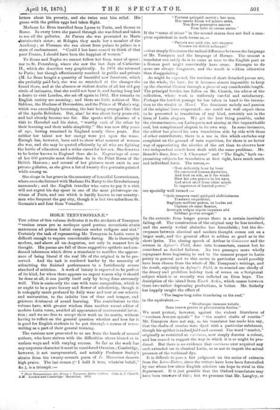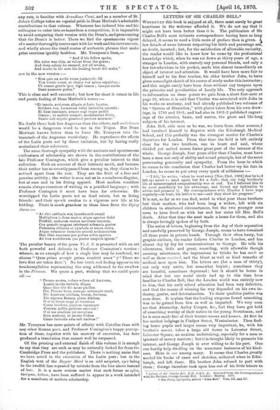HOR. TENNYSONIANZE.• TILE editor of this volume dedicates it to
the students of Tennyson " veuiam orans pro se sociisque quod poetam recentioris mtatis maransum ad priscos Latini carminis modos redigere ausi sint." Certainly the task of representing Mr. Tennyson in Latin verse is difficult enough to require considerable daring. He is thoroughly modern, and above all un-Augustan, not only in manner but in thought. His poems are full of those suggestive epithets and con- densed inferences which drive a translator to sacrifice the appear- ance of being literal if the real life of the original is to be pre- served. And the task is rendered harder by the necessity of submitting the finished performance to a fastidiously severe standard of criticism. A work of luxury is expected to be perfect of its kind, for when there appears no urgent reason why it should be done at all, it can justify itself only by being done extremely well. This is eminently the case with verse composition, which is or ought to be a pure luxury and flower of scholarship, though it is unhappily much profaned by daily wear and tear at our schools and universities, to the infinite loss of time and temper, and grievous detriment of sound learning. The contributors to this volume have, with greater wisdom than another recent editor of modern Latin verse, avoided all appearance of controversial inten- tion ; and we are free to accept their work on its merits, without having to reflect on the general question whether and how far it is good for English students to be put through a course of verse- writing as a part of their general training.
The versions now presented to us are from the hands of several authors, who have striven with the difficulties above hinted at in various ways and with varying success. So far as the work has any corporate character it must be considered Oxonian ; Cambridge, however, is not unrepresented, and notably Professor Seeley's alcaics from the twenty-seventh poem of In Memoriam deserve high praise. The last stanza (" I hold it true, whate'er befall," &c.), is a triumph :—
* Herz TFtanysonianAsive Eclogz e Teeuaysono Latin rechlitx. CursA. J. Church, A.M. London and Cambridge: Macmillan 1870.
"Fortuna quicquid saeviet ; hoc mea, Hoc mente drum vol misero sedet, Non Here praereptos amores Tam dolet ut caress amico. '
If the "sense of crime" in the second stanza does not find a com- plete equivalent in such terms as,— "Peocata nee quid sint, nee unquam
Noscere fns didicit nefasque,"
—that simply illustrates the radical difference between the language of Mr. Tennyson and the language of Horace. The utmost a translator can safely do is to come as near to the English poet as
a Roman poet might conceivably have come. Attempts to do more are always dangerous, and the result is seldom otherwise than disappointing.
As might be expected, the versions of short detached poems are, on the whole, the best; for it becomes almost impossible to keep up the classical illusion through a piece of any considerable length.
The principal burden has fallen on Mr. Church, the editor of the collection, whose work is uniformly careful and satisfactory. Perhaps the hardest passage he has taken in hand is the invoca- tion to the rivulet in Maud. The dominant melody and passion of the original have evaporated ; one could not well expect them to be preserved in translation of any kind, certainly not in the form of Latin elegiacs. AVe get the best thing possible, under the circumstances, —a Latin poem not aiming at this impracticable end, but complete and elegant in its own way. In some instances, the editor has placed his own translation side by side with those of other contributors; there is a use in this which excludes any complaint on the ground of vain repetition, for there is no better way of appreciating the niceties of the art than to observe how two independent minds have dealt with the same problems. Mr. Brandt's lines, from " A Character" and " The Eagle," both un- promising subjects for translation at first sight, have much merit and individual force. The verses,—
" Most delicately hour by hour He canvassed human mysteries, And trod on silk, as if the winds Blew his own praises in his eyes, And stood aloof from other minds In impotence of fancied power,"
are specially well turned :-
" Quin tampon) omni quidquid abditissimum T ractav it oxquisitius,
Regitque molliter pedem, ut laudes euf Captans ab omni gamine, Arcetque vulgus utpote impoteas sibI Sublime poctus arrogat."
In the extracts from longer poems there is a certain inevitable falling-off. The construction of the original may be less involved, and the merely verbal obstacles less formidable ; but the dis-
crepance between classical and modern thought cornea out on a larger scale, and the general effect is seldom so good as in the short lyrics. The closing speech of Arthur in Guinevere and the sermon in Aylmer's Field, done into hexameters, cannot but be considered as decided failures. No two passages more wholly repugnant from beginning to end to the manner proper to Latin poetry in general and to this metre in particular could possibly have been chosen from the whole of Mr. Tennyson's writings, and the result, especially in Aylmer's Field, is to remind one chiefly of the dreary and profitless holiday task of verses on a Scriptural subject which is or recently was inflicted on Eton boys. The description of the island from Enoch Arden, which comes between these two rather depressing productions, is better. Mr. Sotheby has happily caught the effect of "The league-long roller thundering on the reef," in the equivalent,—
" Sinubusque immane volutis
Sara tonare graves in procurrentia fluctus."
We must protest, however, against the violent literalness of " coceinea Auroras spicule " for " the scarlet shafts of sunrise."
Mr. Tennyson does not say, as his translator has made him say, that the shafts of sunrise were dyed with a particular substance, though his epithet is indeed,bold and unusual. The word "scarlet," originally as restricted as coccineus, now simply denotes a colour, and has ceased to suggest the way in which it is or might be pro- duced. But there is no evidence that coccineus ever acquired any such extended use in classical Latin, so as not to import the actual presence of the cochineal dye.
It is difficult to pass a fair judgment on the series of extracts from the Lotos-Eaters, since the writers have here been forestalled by one whom few other English scholars can hope to rival in this department. It is just possible that the Oxford translators may have been unaware of this ; but we presume that Mr. Langley, at any rate, is familiar with Arundines Cami, and as a member of St. John's College takes an especial pride in Dean Dlerivale's admirable contributions to that volume. Whatever has induced him and his colleagues to enter into so hazardous a competition, it is impossible to avoid comparing their version with the Dean's, and pronouncing that the Dean's is better. There we find the spontaneous vigour of a master thoroughly conversant with his work and his instruments, and wholly above the timid centos of authentic phrases that make prize exercises ignobly faultless. Mr. Tennyson's lines,—
" And if his fellow awake,
His voice was thin, as voices from the grave ; And deep asleep he seemed, yet all awake,
And music in his ears his beating heart did make,"
are in the new version :-
" Sive quis ex sociis voces jactaverit, Vox tennis sonat, ut clauso vox wissa sepulchre ; Ut somno gravis ipso, vigil tamen imaque cords Dant numoros pulse."
This is close and well executed ; but how far short it comes in life and poetic feeling of Dean Merivale's verses :-
"Et tennis, socierum aliquis si forte locutus, Striders vox, Lemurum velut imbecilla quorela : Et heel insomnia, somno cogi inque pediri Onanis ; et auditis tremulo modulamine fibris, Suave sub arguto geminari pectore murmur."
No doubt these look less Augustan than the others, and modulamen would be a dangerous word to use in the Tripos. But Dean Merivale knows better than to force Mr. Tennyson into the trammels of the Augustan vocabulary. He reproduces the effects of the Latin poets not by direct imitation, but by having really assimilated their substauce.
The same thorough sympathy with the ancients and spontaneous enthusiasm of scholarship are shown in the contributions of the late Professor Conington, which give a peculiar interest to this collection. Both on account of their intrinsic merit, and because their author has so recently passed from among us, they claim to be noticed apart from the rest. They are the fruit of a free and genuine activity ; the writer is seen not as in a cumbrous disguise, but at ease and in his fitting apparel. Most modern versifiers remain always conscious of writing in a petrified language ; with Professor Conington it must have been far otherwise. Ile worshipped the Latin poets not as dead saints, but as living -friends : and their speech awakes to a vigorous new life at his bidding. There is much grandeur in these lines from the Dying Swan "At cito sublimis vox increbrescit ovanti Multiplices intlexa modes, atquo agmine dulci Profluit, audacem cantos meditate. tenorem, Con quando Inagua° celebrant solentnia gontes Pulsantos citharas et cymbala et aurea sistra, Atque volutatur fremitus procul acclamantnm Hue iliac resonans per perms urbis apertas Ad loca noctiferum qua pastor suspicit ignem."
The peculiar beauty of the poem 7'o J. S. is preserved with an art both powerful and delicate in Professor Conington's version : whence, as an example of how a single line may be rendered, we choose "Quae prima accepit prima remittit amor" (" Those we love first are taken first.") No less truth and feeling appear in his hendeeasyllables representing the song addressed to the swallow in the Princess. We quote a part, wishing that we could quote all :—
"Procne nostra, volons volans ad Anstrum,
Lautis incide tectulia, ibique Quae dico tibi die Inca° puellae.
Die, Procne bona, namque utrumque nosti,
Dic Auatrum nitidum, levem, ferocem,
Dic nigrum Borean, plum, fideletn.
0 si to liceat sequi of feneetrao Carae insiders, pipilom canamquo Cent= mills garriens amorum!
0 si me aimilem tai receptum Sinn mulceat, ut jacens ibidem Cunis lacteolis cam sub umbras!"
Mr. Tennyson has more points of affinity with Catullus than with any other Roman poet, and Professor Conington's happy percep- tion of these, together with his mastery of execution, has here produced a translation that cannot well be surpassed.
Of the printing and external finish of this volume it is enough to say that they are such as may be naturally looked for from the 'Cambridge Press and the publishers. There is nothing amiss that we have noted in the execution of the Latin part : bat in the English text of the Beggar Maid is an odd misprint, eyes being in the twelfth line repeated by mistake from the line above instead of hair. It is a more serious matter that such forms as sylva,
lacryma, letham, have been suffered to appear in a work intended for a manifesto of modern scholarship.































 Previous page
Previous page